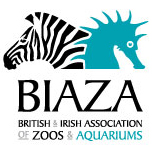Education
In the end we will only conserve what we love.
We love only what we understand.
We will understand only what we are taught.
Baba Dioum, 1968
More than 24 million people (one in three) visit BIAZA collections every year and 1.2 million of those are on an organized education trip. This puts our zoos and aquariums in a unique position to teach and inspire a wide and diverse audience.
For many people, zoos are the only places where they are likely to see and learn about a wide range of animals from around the globe. Amongst an increasing choice of leisure activities, the fact that so many people visit zoos during their spare time shows a widespread interest in seeing living wild animals and a strong curiosity about the natural world.
Nothing can replace the experience of closeness with living animals; they are a zoo’s greatest attraction and its strongest educational resource. We understand that in order to want to protect the natural world we have to understand and care about what it is we’re being asked to protect. Zoos and aquariums offer the opportunity for the general public to form a more personal connection with wildlife, and educational material can direct this emotional response towards a conservation goal.
In 2005 the World Association of Zoos and Aquariums (WAZA) published Building a Future for Wildlife: The World Zoo and Aquarium and Conservation Strategy (WZACS). WZACS Chapter 5 (pdf) is devoted to the vision of zoos and aquariums as ‘leaders and mentors in formal and informal education for conservation’. This strategy places education at the centre of the conservation output of zoos and aquariums; education is ‘critical in achieving the goal of WZACS’.
The education programme of a zoo can help to conserve the natural world in several ways by:
-
Motivating people to change their habits.
-
Inspiring people to get involved with conservation.
-
Encouraging people to donate to particular conservation programmes.
BIAZA collections aim to provide unique lifelong learning opportunities, to raise awareness, to increase respect and knowledge about wildlife and global issues, and thus to engage and connect people of all ages with the natural world.
Click here to find out more about the conservation work of zoos and aquariums.
Find out more about the BIAZA education policy, and how BIAZA zoos and aquariums bring learning into their collections. BIAZA members are involved in a huge variety of education projects every year.
You can also learn more about how BIAZA evaluates its educational initiatives.
Read more about why many BIAZA members are signed up to the Learning Outside the Classroom scheme.
Find out more about BIAZA's Regional Education meetings - why we have them and who to contact.
Finally, our education resources section contains helpful information for both teachers and students.

